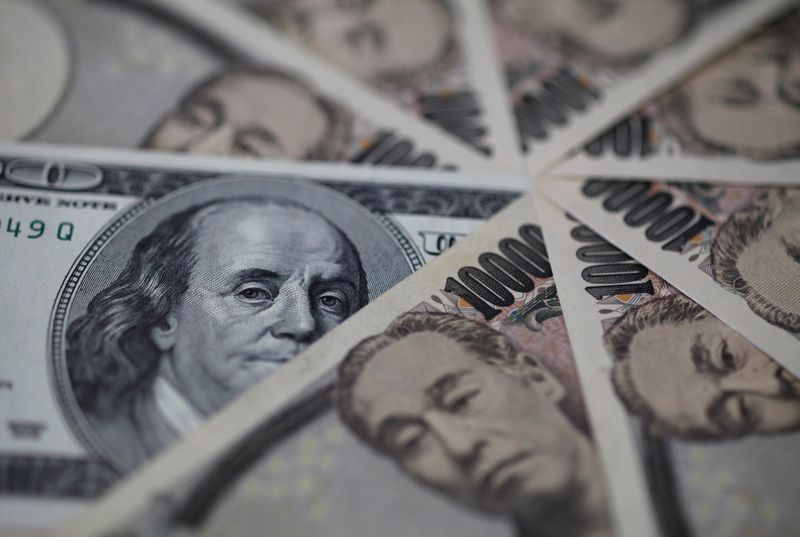By Jamie McGeever
ORLANDO, Fla. (Reuters) - In times of crisis, not much in financial markets roars "safe haven" louder than the Japanese yen.
But in the three weeks of market turmoil since Russia invaded Ukraine, the yen has whimpered its way to a five-year low against the dollar. This time really is different.
The characteristics that usually lay the foundations for yen strength in times of global market upheaval - falling interest rates and commodities prices against the backdrop of a sizeable Japanese current account surplus - are not in place.
Worse still for the yen, these forces are working in reverse: global interest rates, led by expectations for the Fed, are marching higher; energy and commodities prices are soaring; and Japan's current account surplus is small and evaporating.
Currency analysts at HSBC hold their hands up and acknowledge they underestimated the nature of the market shock following the Feb. 24 invasion. Instead of the "typical risk-aversion play" propelling countercyclical currencies like the yen, "currencies of most commodity exporters have performed well in contrast to those of net commodity importers."
And there are few major economies more reliant on imported energy than Japan.
Graphic: Japan Energy Costs & Yen- https://fingfx.thomsonreuters.com/gfx/mkt/zdvxokbgopx/YENENERGY.jpg
Most of Japan's primary energy needs are met by crude oil, more than 90% of which comes from the Middle East. Japan is also one of the world's biggest importers of liquefied natural gas, which accounts for around a quarter of its energy mix.
Brent crude rocketed towards $140 a barrel earlier this month from around $90 before the war started, although it has fallen back below $100/bbl. Asia LNG spot prices have risen almost 20-fold from pre-pandemic levels.
This marks a sharp deterioration in the country's terms of trade, and the yen-boosting current account surplus that Japan has mostly run for decades could soon become a deficit.
"This is an unusual crisis. U.S. interest rates are going up rather than down, oil is going up rather than down. And terms of trade are going against Japan," said Alan Ruskin, macro strategist at Deutsche Bank (DE:DBKGn).
Graphic: Japan Export & Import Prices- https://fingfx.thomsonreuters.com/gfx/mkt/zgvomzxynvd/JapanTermsofTrade.jpg
SAFE HAVEN NO MORE
Ruskin has been watching global FX markets for 40 years. Most major financial shocks in that time - the first Gulf War in 1990, Russia's default and near collapse of hedge fund LTCM in 1998, the Great Financial Crisis of 2007-09, the COVID-19 pandemic in 2020 - have triggered immense yen rallies.
This is because domestic investors suddenly repatriate some of the overseas holdings they have built up in calmer times on the back of Japan's huge current account surplus. Home bias from one of the world's biggest investor pools is a powerful force.
Graphic: Japan Current Account, Trade Balances- https://fingfx.thomsonreuters.com/gfx/mkt/gdpzybljwvw/JAPANCA.jpg
The most powerful yen rally of all came in October 1998, after Russia stunned the world that August with its domestic debt default, which helped trigger the near-collapse of U.S. hedge fund Long-Term Capital Management a month later.
The yen leaped 7% against the dollar on October 7 and soared 16% in that week, both historic moves.
Russia is on the brink of default again, although failure to make coupon payments on March 16 would constitute technical default on its foreign debt obligations. Yet the yen's safe-haven status has deserted it this time around.
Previous bouts of severe market stress or geopolitical tension have usually been associated with interest rate differentials moving in the yen's favor, as U.S. yields fall faster than Japan's.
Graphic: US-Japan Yield Spread- https://fingfx.thomsonreuters.com/gfx/mkt/byprjewbxpe/USJPSPREAD.png
But not now. This crisis, which Russia says is a "special operation" to disarm and "denazify" Ukraine, has accelerated the recent upswing in U.S. bond yields. Markets expect the Fed to act tough on inflation, which is at a 40-year high near 8% and likely to increase even further in the coming months.
Steven Englander, head of global FX strategy at Standard Chartered (OTC:SCBFF) and a long-standing currency market watcher too, reckons the yen is due a bit of a breather. It has lost 2.5% against the dollar in less than three weeks.
But he also notes that any respite will probably be brief, given that the main drivers of a currency's value – interest rate differentials, safe-haven appeal, and underlying economic growth – are working against the yen.
"It's a costly safe haven right now," he says, adding: "The dollar is scoring 3 for 3, and if you add a fourth driver - an energy shock - then there is very little reason to be positive on the yen right now."
(By Jamie McGeever; Editing by Chizu Nomiyama)
